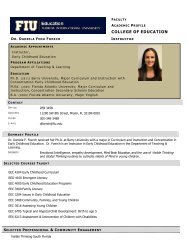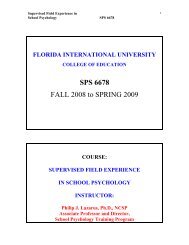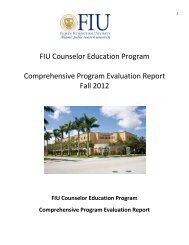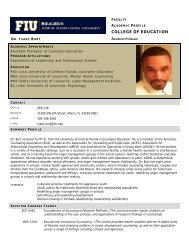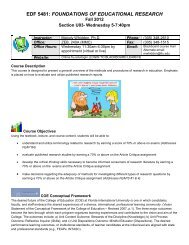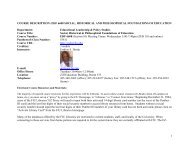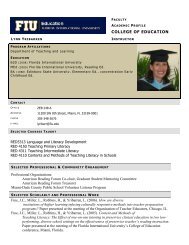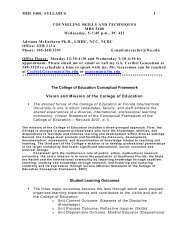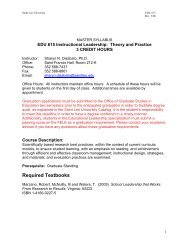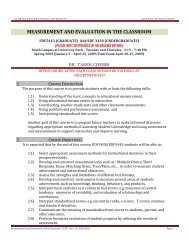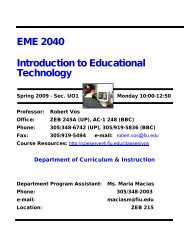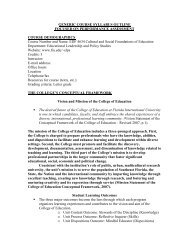2007 - College of Education - Florida International University
2007 - College of Education - Florida International University
2007 - College of Education - Florida International University
You also want an ePaper? Increase the reach of your titles
YUMPU automatically turns print PDFs into web optimized ePapers that Google loves.
World to Sing (In Perfect Harmony)” (Salonga, 1971, track 6), the band actively engages the<br />
members and the audience in thinking carefully about their sexuality.<br />
Performing at mainstream events provides another opportunity for experiencing a<br />
disorienting dilemma. When asked to perform at a mainstream Fourth <strong>of</strong> July parade, DC’s<br />
Different Drummers willingly acquiesced because “the board felt it was good exposure and<br />
incorporated ourselves into the larger community” (P. Shepherd, personal communication,<br />
November 7, 2006). In August 2003, when the Minnesota Freedom Band hosted the LGBA<br />
conference, delegates from LGBA bands worldwide joined together and performed at the<br />
Minnesota State Fair for a “somewhat puzzled crowd” (www.gaybands.org). The disorienting<br />
dilemma <strong>of</strong> the band members could consist <strong>of</strong> starting to think <strong>of</strong> themselves as genuinely<br />
belonging to the larger, mainstream community; the heterosexuals in the audience could have<br />
most certainly experienced some slight discomfort at seeing a GLBTQ band perform at family<br />
events and begin to rethink prior assumptions about GLBTQ individuals and their community.<br />
Self-Examination and Critical Reflection <strong>of</strong> Assumptions<br />
At this stage, individuals begin to examine the underlying reasons for their beliefs and<br />
assumptions (Merriam & Caffarella, 1999). Often, people reconsider the underlying power<br />
structures holding the beliefs and assumptions in place, questioning if in fact they are somehow<br />
wrong. The band’s GLBTQ status “becomes a transformative tool for thinking about the<br />
construction <strong>of</strong> one’s sexual identities vis-à-vis the interrelationships among language, history,<br />
and society” (Sears, 1992, p. 152). Unlike other traditional community bands, LGBA bands must<br />
face the issues <strong>of</strong> homophobia and heterosexism in seemingly simple matters such as selecting a<br />
rehearsal space and concert venue. If the host is not gay-friendly, or at least perceived to be gayfriendly,<br />
then the church or auditorium or any other rehearsal space immediately ceases to be<br />
considered for use. Lesbian and gay bands typically do not allow individuals under age 18 to join<br />
without parental approval for fear <strong>of</strong> being accused <strong>of</strong> pedophilia and ‘recruiting’ youth into the<br />
GLBTQ lifestyle. Furthermore, each individual member must carefully consider who he or she<br />
will invite to an upcoming concert to avoid any accidental outings and possible subsequent<br />
negative repercussions. In each instance, the band and its members must think about what it<br />
means to be gay and how basic societal assumptions about the GLBTQ community affects their<br />
individual choices as well as the falsehood <strong>of</strong> these beliefs and assumptions.<br />
Reintegration with the New, Transformed Perspective<br />
At the final stage, after engaging in critical reflection, people incorporate a new,<br />
transformed perspective with their previously held cognitive framework (Merriam & Caffarella,<br />
1999). LGBA band members learn to accept their own individual GLBTQ status, or role as a<br />
heterosexual supporter, and celebrate their sexuality through performing works by GLBTQ<br />
composers such as Aaron Copland, Benjamin Britten, and Peter Tchaikovsky and a host <strong>of</strong><br />
Broadway medleys. The music encountered in LGBA band performances comprises a cultural<br />
artifact <strong>of</strong> GLBTQ life in America; performing such music helps solidify a unique identity and<br />
sense <strong>of</strong> community for GLBTQ individuals (Saliers & Saliers, 2005). More importantly,<br />
however, once the band members consciously accept not only their individual status as gay or<br />
lesbian but also the band’s status as gay or lesbian, it opens an avenue to begin working on<br />
behalf <strong>of</strong> the GLBTQ community. After realizing the marginalization they and the band must<br />
endure because <strong>of</strong> their sexual minority status, it helps transform their mindset from one <strong>of</strong><br />
passive acceptance to one <strong>of</strong> community activism and social action.<br />
3



